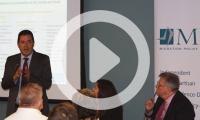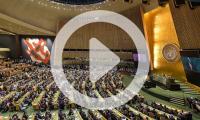
Natalia Banulescu-Bogdan
Deputy Director, International Program
Natalia Banulescu-Bogdan is Deputy Director of MPI’s International Program, where she oversees the Institute’s comparative work on social cohesion, migration and development, global governance, and climate. She has authored numerous publications on social integration and identity, public opinion and narratives, and international cooperation on migration, with a particular focus on Europe and Latin America. She is also a Nonresident Fellow with MPI Europe.
|
Media Requests |
Ms. Banulescu-Bogdan has represented MPI at international events and processes such as the Global Forum on Migration and Development, the International Migration Review Forum, the Group of Friends of the Quito Process, working groups of the Los Angeles Declaration on Migration and Protection, and the Organization for Economic Cooperation and Development’s working group on migration communication (NETCOM). She regularly advises governments and international organizations on the design and implementation of migration policies and programs, including on topics such as combating xenophobia, targeting development investments, and designing effective communications strategies around migration.
Since joining MPI in 2008, Ms. Banulescu-Bogdan has also worked closely with MPI’s flagship international initiative, the Transatlantic Council on Migration, through which she has helped advise stakeholders on various aspects of migration management and authored countless private policy memos for governments in Europe, North America, and beyond. Prior to joining MPI, she worked at the Brookings Institution, helping to develop public policy seminars for senior government officials in the Institution’s executive education program.
Ms. Banulescu-Bogdan obtained her master’s in nationalism studies from the Central European University in Budapest, Hungary, where she wrote about the political mobilization of Roma in Romania. She received a bachelor’s degree in international relations from the University of Pennsylvania. In her personal time, she manages an informal network of community volunteers supporting newly arrived refugees in Washington, DC and Maryland.
Bio Page Tabs
This MPI Europe webinar reflects on the implications of this current moment for European economies and societies and the role of immigration and immigrant integration policy, and highlight research from the European Commission’s Joint Research Centre on the fiscal and demographic impacts of migration.
This webinar, organized by MPI and the Zolberg Institute on Migration and Mobility at The New School, discussed migration policy responses around the globe in response to the COVID-19 pandemic, and examined where migration management and enforcement tools may be useful and where they may be ill-suited to advancing public health goals.
The Colombian Response to the Venezuelan Migration Crisis: A Dialogue with Colombia’s Migration Czar
Felipe Muñoz, Advisor to the President of Colombia for the Colombian-Venezuelan Border, discusses how Colombia is coping with the influx of Venezuelan migrants, plans for future policy decisions surrounding this migration, and developments in regional and international cooperation.
In advance of the December 2018 adoption of the Global Compact for Safe, Orderly, and Regular Migration, which includes a commitment to facilitate the return and reintegration of migrants, this webinar examines the policies, practices, and contextual factors that make compulsory returns such a difficult issue for international cooperation.
As the final phase of preparations for the historic adoption of a Global Compact for Safe, Orderly, and Regular Migration approaches, this webinar explores two central objectives of the compact: enhancing the availability and flexibility of pathways for regular migration, and investing in skills development.
Pages
Recent Activity
This virtual conference explores how the diverse landscape of partnerships, social enterprises, participatory models, and community-led initiatives spearheading social innovation for inclusion has fared during COVID-19. It also focuses on how this ecosystem can emerge strengthened from the pandemic, and be a vital force in addressing new humanitarian challenges.
El anuncio del presidente de Colombia que los estimados 1,7 millones de migrantes venezolanos recibirán un estatus de protección temporal migratoria por un periodo de diez años representa un hecho valiente y sin precedentes en América Latina. El reto que sigue será el de poder materializar este esfuerzo en una política pública que abogue por un proceso de cohesión social en el país.




















¿Qué sigue ahora luego de que Colombia haya dado un paso histórico en materia de migración?
What Comes Next Now that Colombia Has Taken a Historic Step on Migration?
Coronavirus Is Spreading across Borders, But It Is Not a Migration Problem
The Election Results Are In: It Is Neither the End of Europe nor Its Rebirth
The Dutch Elections: How to Lose and Still Shape the Direction of a Country—and Possibly a Continent?